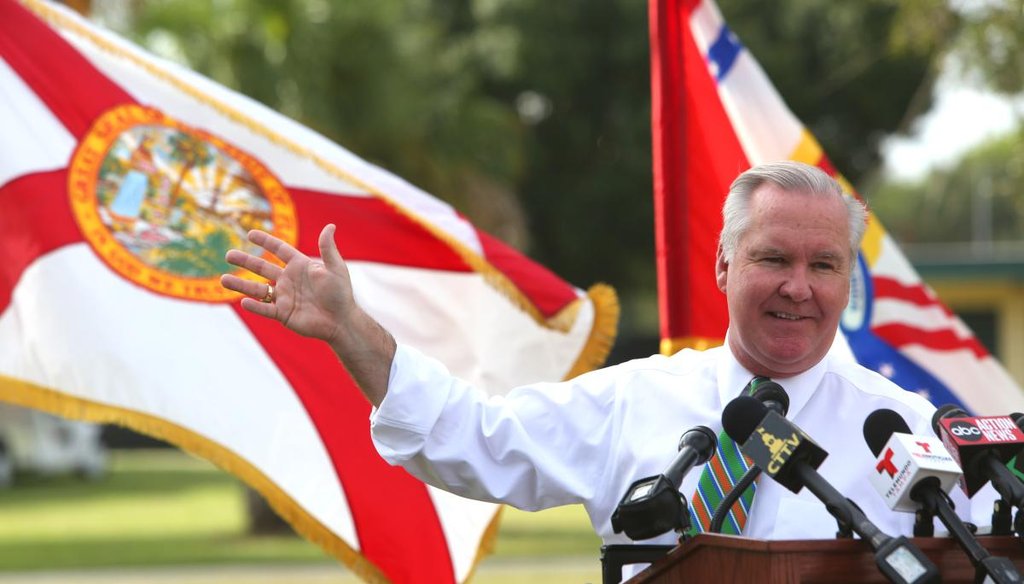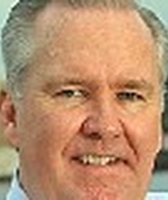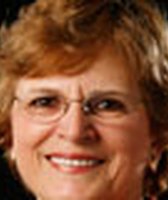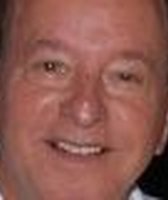Stand up for the facts!
Our only agenda is to publish the truth so you can be an informed participant in democracy.
We need your help.
I would like to contribute

Tampa mayor Bob Buckhorn describes his plan for Julian B. Lane Riverfront Park at a September 2014 news conference. Times photo.
Leave it to Bob Buckhorn to campaign for mayor on a platform of laser-focused promises. And leave it to him to improvise on the follow-through after being elected.
"I took a different path," Buckhorn said recently of a parks promise where he pledged to do one thing but delivered, by many measures, a lot more of something else.
Overall, Buckhorn kept most of his campaign promises, according to the Buck-O-Meter, a project of PolitiFact Florida, the political accountability team at the Tampa Bay Times.
The Buck-O-Meter tracks his performance on 34 campaign promises. With the end of Buckhorn’s four-year term approaching, PolitiFact’s ratings are 21 Promises Kept, nine Compromises and four Promises Broken.
"During the campaign I asked people to judge me on whether I did what I said I was going to do," he said. "For the most part I think we accomplished that."
Sign up for PolitiFact texts
The mayor’s lone declared opponent in next year’s city elections is not impressed.
Former Occupy Tampa activist and Seminole Heights acupuncturist Becky Rubright said Buckhorn has spent his term "trying to associate himself" with good things in Tampa whether or not they are "any of his own doing."
"He’s clearly just so personally ambitious that it doesn’t make me feel like the city is being cared for," said Rubright, who says she would seek to create economic development programs for areas outside of downtown. "He puts himself front and center so constantly."
(Rubright’s own platform would make grist for a "Beck-O-Meter:" She wants to raise the minimum wage inside Tampa to $15 per hour, decriminalize marijuana, require body cameras for police, create a citizens review board to review allegations of officer misconduct, get rid of older armored police vehicles and donate half the mayor’s $150,000 annual salary to community causes.)
Mostly, Buckhorn established his record on campaign promises quickly — in one case, during his first week on the job. But several took longer to receive a final Buck-O-Meter rating, partly because he veered from the path he charted as a candidate.
Case in point: During the 2011 campaign, he promised a series of initiatives to improve parks and public spaces, including creating a Parks Advisory Board.
As mayor, Buckhorn’s parks and public space initiatives have been among the boldest of his administration. But he hasn’t done exactly what he promised.
"Those would have been baby steps by comparison to what we actually accomplished," he said.
The list of initiatives that Buckhorn didn’t promise yet has delivered includes free public WiFi in downtown parks, the new Coast Bike Share program, and — in the works — a program allowing people to drink alcohol on the Riverwalk.
Nor did Buckhorn promise what has turned out to be a signature strategy he’s pursued both inside and outside city parks — his knack for taking unused city property and finding private sector partners to give it new life.
It’s an approach he used for:
• Water Works Park, where the city spent $7.4 million, while restaurateur Richard Gonzmart spent another $6 million creating Ulele Native-Inspired Food & Spirits in the old city pumphouse next door.
• The historic federal courthouse, reborn as a Le Méridien boutique hotel. (Before the $26 million project, City Hall spent $100,000 a year air-conditioning the building just to fight mold and mildew.)
• The planned Residences on the Riverwalk, where the city plans to realign the intersection of Cass and Tyler streets to create a new city block for the 36-story apartment tower.
• Ybor City, where the city has agreed to sell a piece of vacant land near Interstate 4 for a new apartment complex.
While Buckhorn did not create the promised parks advisory board, he has involved residents in the planning for one of his biggest projects: the proposed $20 million redevelopment of Julian B. Lane Riverfront Park.
For that, a city consultant did about 40 interviews, then held four public meetings at Blake High School about plans. More than 350 people participated.
"If you created a parks advisory board for every one of the parks in our system, you would create a lot of committees that would have nothing to do, and you would be wasting people’s time," Buckhorn said.
The Buck-O-Meter rated the mayor’s follow-through on his parks pledge as Promise Kept because the accomplishments were significant and, while different in their approach, in keeping with the spirit of the original promise.
But the Buck-O-Meter gave the mayor a Promise Broken on his vow to offer down payment assistance and low-interest loans to police officers willing to live in the city.
"We haven’t been able to do that," he said.
Buckhorn got a Compromise for his housing initiative in Sulphur Springs. That rating means his accomplishment was substantially less than what he promised, though consistent with the original goal.
Buckhorn promised a program modeled on the city’s Challenge Fund of the late 1980s and early 1990s. At its peak, the Challenge Fund built or rehabilitated 1,600 houses a year.
By comparison, Buckhorn’s Sulphur Springs initiative has cleared vacant houses from 51 lots and built 11 houses, with construction of more expected early next year.
He got a Promise Kept on his support for the University of South Florida’s research mission.
PolitiFact’s rating cited Buckhorn’s willingness to provide downtown redevelopment money, city lobbying support and his own bully pulpit to help USF build a new medical school building on downtown land owned by Tampa Bay Lightning owner Jeff Vinik.
A downtown medical school, Buckhorn said, would help USF attract talent, which would help lure companies that need talent.
If elected to a second term next March, watch for "more of the same," Buckhorn said. "It’s been a good four years, and I think the next four are going to be even better."
Our Sources
See promise updates.

























